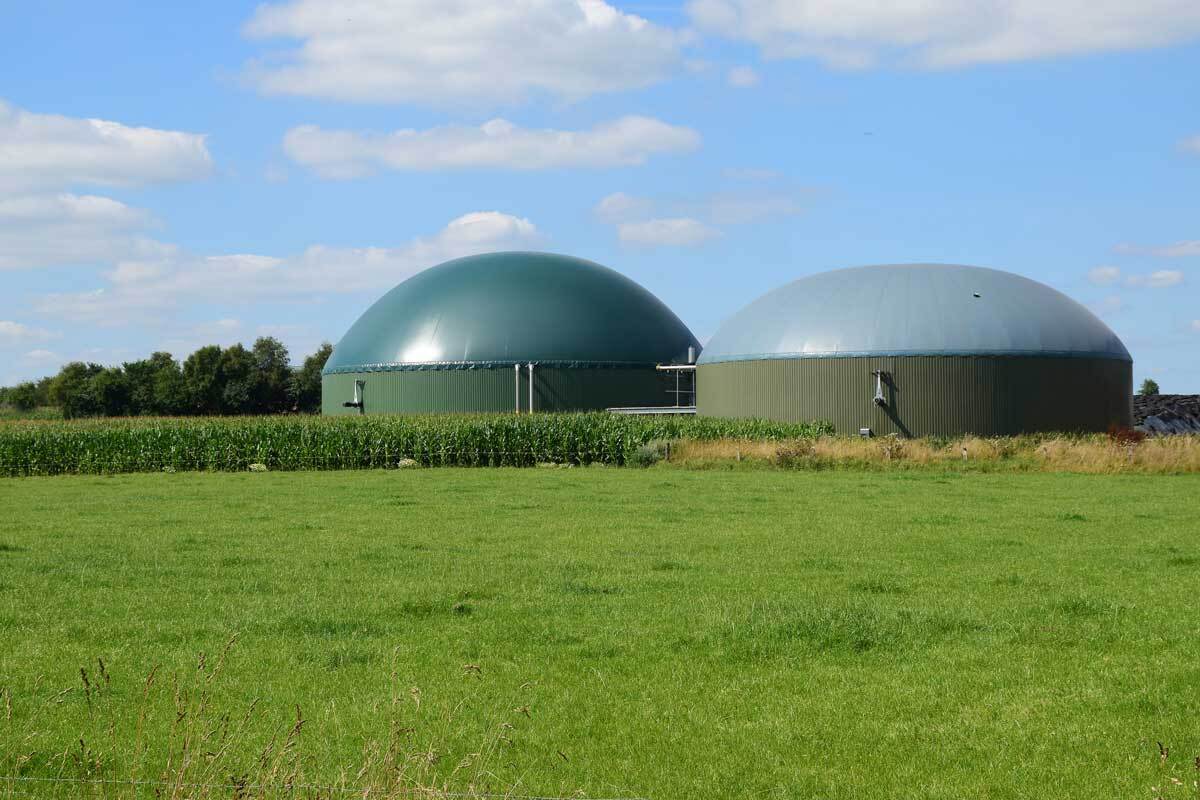Removing H₂S and VOCs from biogas
Across Europe, authorities and businesses are increasingly recognising the potential of food waste as a source to produce renewable energy from. Activated carbon filtration is regarded as the best available technology for filtering biogas so it can be upgraded into biomethane and injected into national gas grids.
The problem
A waste management company has a site in southern Belgium where it processes food industry waste. It uses anaerobic digestion as technology to produce biogas.
It used to feed this biogas into a combined heat and power (CHP) engine to produce a renewable form of power. DESOTEC supplied a mobile filter to remove hydrogen sulfide (H₂S) from the gas to avoid damaging the engine.
Recently, the company decided instead to upgrade the biogas into biomethane (CH₄) so that it can be injected directly into the national gas grid. This makes more sense financially.
However, this requires the biogas to undergo an additional stage of purification in order to avoid damaging the membrane technology used in the upgrading process; and so that the biomethane is pure enough for use in the national grid.
As the biomass at this site is food waste, it contains high concentrations of volatile organic compounds (VOCs): between 500 and 1 000 mg/m³. Levels of H₂S are around 100 to 200 ppm. For biomethane, both H₂S and VOC levels need to be extremely low: under 5 ppm.
As the company was already working successfully with DESOTEC, it turned to us again for support with its new plans.


The solution
We drew on our extensive experience in the biogas and biomethane markets to design an effective system for this client.
We have now supplied three AIRCON HC-XL filters in series to handle a flow rate of 1 000 m³/h. The first contains impregnated carbon, which removes the H₂S. The second and third filters contain non-impregnated carbon to treat VOCs.
Placing filters in series ensures that treatment objectives are met: if one filter becomes saturated, the next will adsorb the contaminants until the first is exchanged. This also optimises the consumption of activated carbon, making for a more cost-effective and sustainable set-up.
After the biogas has been filtered, it is pure enough to be passed through membranes which separate it into two streams: biomethane, and carbon dioxide. The latter can be released safely into the atmosphere.
The results
The filters were installed before summer 2021, and are successfully reducing H₂S and VOC levels to below 5 ppm. Activated carbon is regarded as the only technology capable of reducing these contaminants to such low levels.
It is envisaged that each filter will last around a year before it requires exchange. One of the key advantages of a mobile rather than a fixed filter system is that exchange is quick and simple. Biomethane production at this site is continuous, and the company is paid while it supplies the national grid. Therefore, lengthy downtimes would lose the client significant sums of money.
Furthermore, DESOTEC has the largest mobile filter fleet in Europe, so we can respond rapidly when a filter exchange is required.
We then transport closed filters safely away from clients’ sites and take them to our facilities, where all spent carbon is analysed so the right safety measures can be taken for handling it. All molecules that were adsorbed onto the activated carbon are desorbed inside DESOTEC’s reactivation furnaces. These contaminants are then destroyed in accordance with national and European legislation by an incineration and neutralisation set-up. The entire installation and its emissions are under continuous online monitoring, ensuring that only harmless water vapour exits the chimneys.
Contact DESOTEC today
To discuss how our mobile activated carbon filters could work at your site, contact our team of engineers today.
Contact our expertsContact DESOTEC today
To discuss how our mobile activated carbon filters could work at your site, contact our team of engineers today.
Contact our experts-
Air & gas purification
Our sustainable filtration solutions ensure air purification, odour control, and high quality process gases such as biogas and biomethane. -
Our unique service
Our closed-loop, full-service model is as unique as your business needs. We’ll define the right filtration setup and safely recycle filtration waste, making it easy to go green. -
Your sustainability journey
We care about protecting our air, water and soil for future generations, just like you. Our filtration solutions help you meet environmental standards, reducing your carbon footprint.


